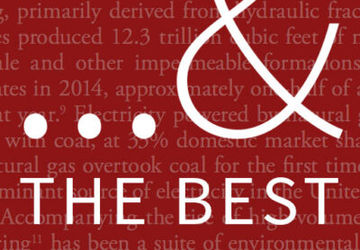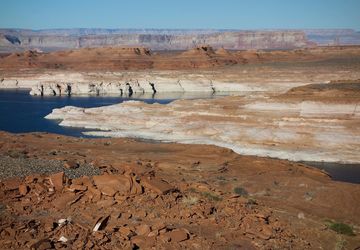The winners of this year's Firestone and Golden Medals and Kennedy Thesis Prizes (named for Lane Center Co-Founding Director David M. Kennedy), which are given annually to the best undergraduate honors theses at Stanford, were recently announced. The Lane Center is especially proud of Cade Cannedy, who was awarded a Firestone Medal for Excellence in Undergraduate Research for “Why Your Air Will Not Get Better: Path Dependence and Capture in Air Quality Regulation.” Cannedy's thesis builds on his work as a research assistant for the Center, and the project was advised by Faculty Director Bruce Cain. Cannedy is the third Firestone winner Cain has advised since 2016.
When Cannedy first joined the Bill Lane Center as a student researcher in the summer of 2018, his focus was on air pollution in the San Joaquin Valley and what local community groups were doing about the issue. What followed were multiple trips to meet with community organizers and environmental justice advocates in Fresno and the Central Valley.
"I was immediately enamored with the people I met and the severity of the challenge they faced," Cannedy said of these meetings. "In many ways, they reminded me of people within my own community in Northern New Mexico who have been vigilantly organizing against an environmentally disastrous molybdenum mine, which has since become a superfund site. I identified with their struggle to improve their community and living conditions in the face of some of the most powerful industries in the country: oil and agriculture. It's hard to describe how deeply the community groups I reference at the outset of my thesis impacted me. Their perseverance, tenacity, and above all their hope that things will eventually improve prompted me to help in whatever way I could. I'm in the process of returning some of the results of my work to them, so they can employ it in their advocacy."
Iris Hui, senior researcher at the Bill Lane Center, was impressed with Cannedy's close look into officials on the local air resources board in the Central Valley. "He painstakingly collected background information of all previous board members and developed a theory about regulatory capture," Hui noted. "His work is groundbreaking and original. It helps to explain why, despite the state's effort to improve air quality, the Central Valley remains behind in standards."
Cannedy's research is of growing importance in the American West where climate change continues to threaten air quality. As a result of higher temperatures, dangerous pollutants like ozone form more quickly in the air. Droughts have led to more wildfires, which pose a significant health risk due to particulate matter pollution from smoke.
Through the Bill Lane Center, Cannedy worked with Kari Nadeau and Mary Prunicki at Stanford Medicine on a project examining the effect of wildfire smoke on health outcomes. Citing his research on three California air basins, Cannedy learned that more than 14,000 people die premature deaths on an annual basis as a result of excessive pollution.
"The health impacts of air pollution are severe," Cannedy explained, "affecting every organ in the body and degrading the immune system. Importantly, recent research has also demonstrated that pollution exposure can create epigenetic changes meaning people face greater health consequences even after moving from polluted areas."
The current COVID-19 crisis has amplified these health problems. Studies released during the pandemic have shown higher rates of adverse outcomes from COVID-19 in polluted areas, suggesting air pollution might impact the immune and cardiovascular systems as well.
In addition to exploring air pollution from a health and environmental angle, Cannedy's thesis also looks at social and economic factors, investigating the structural inequalities that leave economically disadvantaged communities and people of color to bear disproportionate environmental burdens. "Sustained poor air quality is both a cause and byproduct of structural inequality and its amelioration via local political channels is difficult if not impossible. The solutions lie in evolving regulatory powers away from the local levels where they are more easily captured by special interests and working to undercut the socio-economic disadvantages that place the most vulnerable closest to the externalities of polluting production," Cannedy wrote in an email.
According to Cannedy, the Bill Lane Center was instrumental in supporting and strengthening his research, and he found excellent mentors in Bruce Cain and Iris Hui: "I consulted with them on the research design and it was their urging that originally prompted me [to pursue] the topic. Had it not been for the Center's support, this project would not have been possible. Bruce and Iris offered extremely helpful critiques. They kept me on track throughout a very hectic spring quarter and I am thankful for their guidance."
The Bill Lane Center congratulates Cade Cannedy on his Firestone Medal, and is thrilled to support undergraduates as they pursue some of the most important and challenging issues the American West must face.



